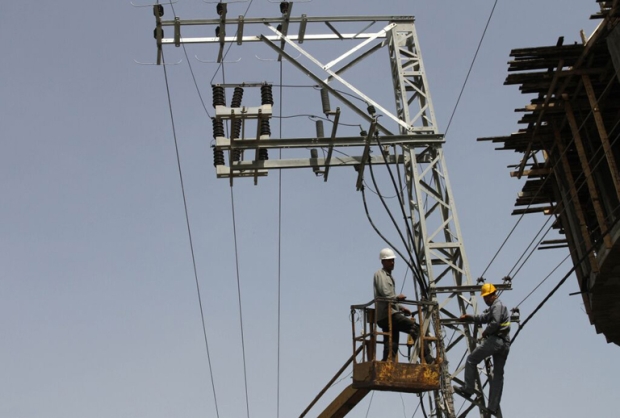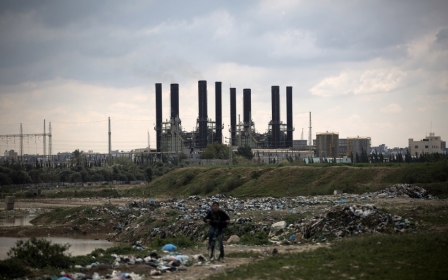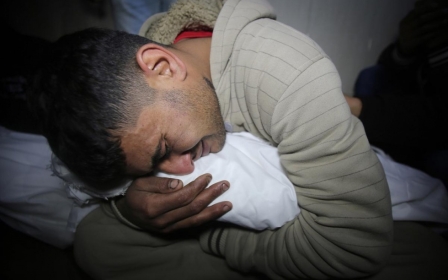Gaza power outages spark protests

RAFAH - After not having electricity for three days, hundreds of people took to the streets and gathered in front of the Electricity Distribution Company in Rafah, located along the southern Gaza Strip, on Tuesday to protest the frequent power cuts crippling the city.
“This is unlivable during this heat wave, with three hours of power and 20 hours off”, said Mohammed al-Jammal, an advocate for the demonstration. Palestinians have been using social media to express their anger about the electricity cuts and many decried injustice at the hands of the electricity distributors.
Electricity shortages in the Gaza Strip began in 2006 when Israeli F16 fighter jets bombed Gaza’s sole power plant. Since then, the plant has operated on minimal capacity and only when the Strip can purchase electricity from Egypt and Israel.
According to United Nations Office for Humanitarian Affairs, three sources supply the Gaza Strip with electricity: purchases from Israel (120 megawatts, MW) and Egypt (28 MW), and production by the Gaza Power Plant (GPP), currently at 60 MW.
However, the total 208 MW does not come close to meeting the needs of all 1.8 million people living in the Gaza Strip - this supply satisfies only approximately 46 percent of the population. In addition, power cables in the ground are often dead, and much of Gaza gets left in the dark as the electricity company tries to ration its meagre supply across the coastal enclave.
The blame game
“One does not know who to blame, but I feel there is unfair distribution of whatever electricity is available,” said al-Jammal.
Local officials have blamed the PA for imposing a tax on transport and security - known as the “blue tax” - on industrial fuel arriving to power Gaza’s plant. For several months, Qatar has paid the tax on behalf of Gazans to the PA. Yet al-Jammal said several residents blame Israel for bombing the power plant as the main cause of the crisis.
The Ramallah-based Energy Authority (EA) accused the GPP of not paying important fuel fees. In fact, the EA claims they are owed debts for several years.
It blamed the Gaza electricity company for collecting bills from Gazans, but refusing to send the money back to the EA. Al-Jammal said that the majority of people in Gaza can’t afford to pay for electricity, since most residents are unable to acquire adequate jobs.
“In Rafah, the issue is not only power cuts," said Khalid al-Asmar, 24, "it is more than that. When you have no electricity that means no running water for washing and hygiene, cooking or boiling water,” he added.
As the debate heats up, under the scorching sun, Gazans are getting more restless about the constant power cuts and the high cost of fuel for electricity generators.
“In the past we could afford fuel, from the tunnels, at 3 NIS ($0.79) per litre. But, now it’s doubled,” al-Asmar explained.
Seething anger
The anger can be openly felt at al-Nijma square in Rafah. Patients and staff at the local hospital, supermarket owners, families with children, all need to cool down. Frustrated youth feel the heat, day and night.
Ashraf Juma, a Palestinian Legislative Council member (PLC) for Fatah, called on Rafah’s citizens to participate in a “civil disobedience” campaign.
Juma publically expressed that Rafah is in dire conditions as a result of power cuts over the past few weeks. Juma has asked the public not to pay their electricity bills until electricity is turned on in their homes.
He stated that residents are getting billed for electricity they don’t have.
As a PLC member, he called on all factions to forget their political differences by holding a united conference inviting all officials of the electricity company to answer public questions.
Stay informed with MEE's newsletters
Sign up to get the latest alerts, insights and analysis, starting with Turkey Unpacked
Middle East Eye delivers independent and unrivalled coverage and analysis of the Middle East, North Africa and beyond. To learn more about republishing this content and the associated fees, please fill out this form. More about MEE can be found here.





